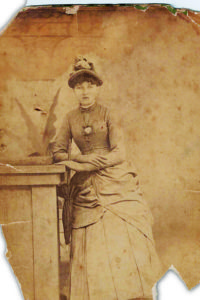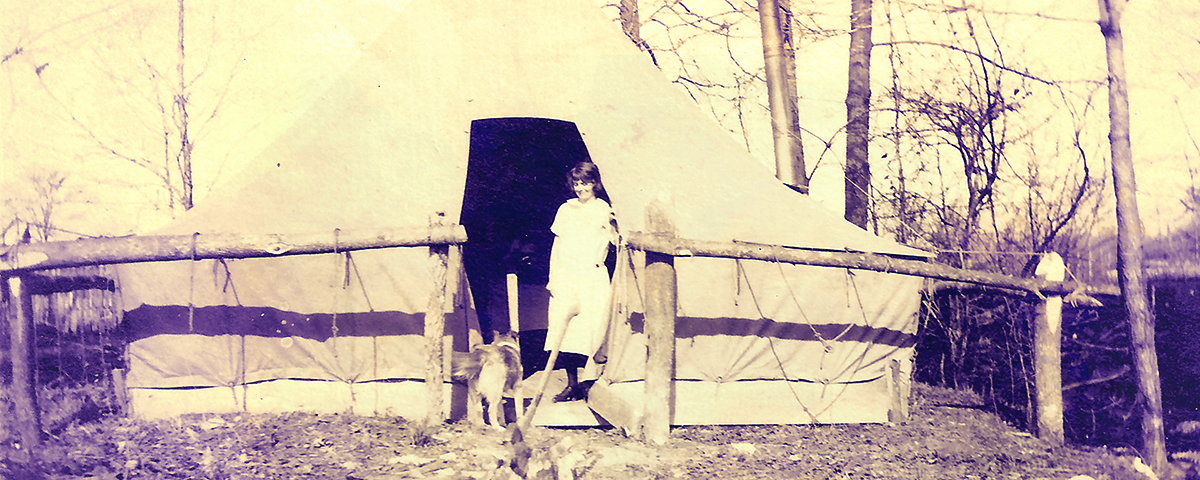Roughing it along the Mississippi River through the eyes of a woman who lived it
MARY MANN was born around 1866 in Arkansas. Her family operated a boarding house where she was working in 1884 when she met and married Frank Hamilton, an older Englishman with a mysterious past who managed logging camps. As Frank Hamilton’s career carried him around the Mississippi Delta, then in its frontier days, Mary accompanied him, boarding and feeding work gangs and moving with her children and other kin from forest to forest, often separately from her husband. Toward the end of her life Mary Hamilton resided in Philipp, Mississippi, where, in 1931, Helen Dick Davis, a writer and neighbor with a family link to Hamilton, found the older woman’s tales of pioneer life charming. Davis urged Mary Hamilton to

write a memoir. In 1933, Hamilton handed Davis a 150,000-word manuscript that Davis edited and sent to Little, Brown. The publisher rejected Hamilton’s recollections. She died circa 1936. In 1991, Davis’s children came upon the Hamilton manuscript and submitted it to the University of Mississippi Press. To much fanfare—but without the Hamilton family’s permission—the university published the memoir as Trials of the Earth: The True Story of a Pioneer Woman. The family took legal action to establish ownership of the material. In 2013, Mary’s great-grandson Kerry W. Hamilton self-published an edition by the same title. That venture’s success led to a contract with Little, Brown, which in 2016 published its edition of Trials of the Earth. This excerpt, adapted with permission from Little, Brown, begins with Mary and companions, including daughters Nina and Leslie, trying to connect with Frank, who has been away working in Missouri. They travel down the Mississippi to his latest logging site, which juts into the big river from its east bank. The Hamiltons recently have buried a son, Oswald, accidentally poisoned by a physician.
…It was a cold gloomy morning in January 1896 when I started with my two little girls, my sister Lucy, and my brother Johnny to what was to us a new world, the Mississippi Delta. Frank sent us directions how to go to Memphis, but no further, as he was to meet us there, and we were to go on by boat, the Kate Adams, to our new home on Concordia Island, five miles from Gunnison, Mississippi. We missed Frank and had to take a train to Gunnison. Frank got to Memphis and came tearing across town just in time to see our train pulling out. He knew we wouldn’t get to Gunnison until the next day, as we had to lay overnight in Delta, Mississippi. So he came right back by boat and met us the next day at Gunnison.
Oh, I was so glad to see him again. He was tanned and 15 lbs. heavier. Nina knew him, but baby Leslie wouldn’t have a thing to do with him. He hadn’t seen her since she was a few weeks old, and now she was running everywhere and talking some.
Frank and Jim Thompson were working together. Jim was there to meet us, with Frank. “Wait till you see your beautiful new homes,” Jim said, and I could see he was a little uneasy for fear I would be disappointed. We went from Gunnison in a two-horse buggy, Frank and Jim on horseback. We drove down the Mississippi River levee about a mile, then turned off the levee down into the thickest timber I had ever seen. Oak, gum, ash, hackberry, and poplar stood so thick, with no underbrush, only big blue cane growing rank and tall, almost to the limbs of the trees. It looked so odd, but what looked odder still to me was the black mud—“gumbo,” Frank said it was. By the river, the ground was black sand, and the woods were thinner. There were fewer trees but larger—big old cottonwoods and sycamores whose tops were lost in the sky. It was a pretty sight, except for the road—the soft black sand was almost hub-deep, but at last we came in sight of our future home, and what a sight!
Jim’s office and commissary and bedrooms were built of clapboards, his cook shanty the same, with a small dining room for the white men, who were never more than four, as he worked with Negroes. Then there were the Negroes’ cooking shanties and a few cabins; it was like a little town. Jim rode alongside the buggy and asked me what I thought of “Clapboard City.” I choked back a sob, I don’t know whether of relief or disappointment. “Fine,” I managed to say. “I have always wanted to try camp life.”
Frank had stopped at the roadway to see about some oxen teams, and Jim went on with us. He explained that at Gunnison the river began a 40-mile bend, coming back almost to Gunnison again and that was why the land lying between the river and the levee was called Concordia Island, although it really was a long neck of land surrounded by water—all but a little strip at Gunnison.

Beyond Jim’s place we saw a big white tent, the largest I have ever seen. Nina pointed to it and said, “Pretty white house.” Nothing would satisfy her but to drive right on down there. It was a big tent—30 by 20 feet, floored and boxed in four feet high; there was a nice big cookstove in the front end and a big heater in the middle. The back was curtained off into bedrooms, small but large enough. This was to be our home, as Frank had to live and sleep out of doors. I had left Lucy at the hotel in Gunnison until our things came, and I was glad I had known better than to let her come out in camp before we got fixed up.
We stayed that first night with Jim. Nina took up with him, and he said it was like finding his own little girl. Nina, like me, had never gotten over Oswald’s death, but the change to this new country, and being with her father, were helping us
both already.
The next day our things came, and I sent after Lucy. She was, as I knew she would be, disgusted with everything, but I kept her so busy she couldn’t say much. We put down carpet in the back of our tent house. It reached from the back of the tent to the heater, and I had rugs for the other side. We put up our two bedsteads and a child’s bed. I had four big feather beds besides the child’s feather bed and eight big feather pillows. That sounds silly now, but in those days the more feather beds you had the better off you were supposed to be. And I had plenty of nice bedclothes. When we got all our things in—our dining table, little cook table, cupboard for dishes, cupboard for clothes, trunks, and small, splint-bottom homemade chairs—we were fixed up nice. We had plenty to cook, and oh, how you can eat in camp. Jim took his meals with us. He had a big commissary and wouldn’t let Frank charge hardly anything to himself. He never went to town without bringing
us all kinds of choice cuts of meat, and fruit, and he never
forgot the children. Would bring them toys, clothes, anything he thought they would like.
Once settled, I had time to look around, see more of the strange country and people, and adopt them as my own. It was a mild winter, and almost every day I took my children and Lucy and went to the riverbank to watch the men build their raft of logs.
Frank or Jim was at the raft all the time, with the other one in the woods. They had from six to eight log wagons going all the time, the eight wheels boxed in to keep them from bogging up in the mud, and from eight to ten oxen to a wagon. Many logs were so large they couldn’t get but one on a wagon. I have seen Frank stand on the ground beside the butt cut of a tree, and he could just lay his hand on top of it. The men hauled the logs to the riverbank and rolled them into the river; then they would float them up against the raft and fasten them together with poles. Gum and oak they called “sinkers”; these they would pin between cottonwoods, ash, and cypress—“floaters”
—to keep them from sinking. A large rope was tied every 50 feet with wire cables to trees along the bank or to posts driven into the ground. When the men got enough logs rafted together to send to Greenville, they would send for tugboats, bunch the rafts together, and float them downriver to be sold. Their names were stamped in the end of every log, but there were people on the Mississippi River who made their living stealing marked timber, sawing off the ends, and stamping them with their names.
Soon winter was over. Violets were everywhere, and green grass, and the trees putting out leaves. Spring was in the air, in our blood, in the frogs, too, for they held a concert every night. Bees were flying around gathering honey from the holly blooms. Every day men felling timber would find a bee tree, and Frank would bring in three or four gallons of fine honey.
We were all happy but Lucy. She was gloomy, blue, discontented. Said she couldn’t stand this godforsaken place any longer. The lady that ran the hotel in Gunnison had visited us several times, and she and Lucy took a liking to each other. I wasn’t surprised when Lucy came to me one day and said, “I’m going to Gunnison to stay at the hotel with Mrs. Huse. I will help her enough to pay my board, until you get out of this hole.” Johnny took her to Gunnison, and she returned only on short visits. I am afraid we all felt relieved when she left, for she was so dissatisfied she took lots of brightness out of our lives, but I missed her lots.
…There was but one drawback to life on the island, and that was water. We had to haul it from a neighbor’s well or from the river and filter it. The management kept saying they were going to drive me a pump, but they kept putting me off. When they finally began to draw their work on the island to a close, they drove a pump for me about 200 yards from the river. They drove 60 feet and got fine water, clear and cold.
It didn’t last.
The raft they were making was a mile and a quarter long, fastened securely, tied with oiled ropes and wire cables to big trees, some of them 100 feet from the bank. The day after they drove my pump, the wind got up. We heard a roar like thunder, then another. All the men began running to the river. My brother Johnny came back, ran to the corral, and caught Jim Thompson’s horse. He told me the river banks were sloughing off, and they were afraid the raft would go before they could get tugboats enough to handle it. Jim rode to Gunnison to telegraph for more boats. Everything was hurry, confusion, excitement. Frank came to the tent and told me to stay away from the river. “And if you see it getting too close, take the children and go back half a mile. Never mind taking anything else,” he said. “It looks serious, and there’s no telling where the banks will stop sloughing.” Then he hurried away.
Johnny shared a tent with the cook and a fellow who had been sick for days. Johnny got all the buckets he could and he and the cook began carrying water from the pump. They hauled the cook a barrel and us one. That roaring “boom, boom” came every few minutes, and I could see tree after tree slipping into the river. I took the children up the road a piece, fixed them a playhouse, and left them to play. In spite of Frank’s warning I had to see. What a sight! Big muddy Mississippi River waves were rolling and lashing the banks. The banks were crumbling, maybe 50 feet at a time slipping into the river. The roadway was gone, and my dear pump stood at least 100 feet out in the river. The raft was swinging around but hadn’t broken apart, and the end was secured to the one tugboat the men had managed to pick up. Men were working like mad, unfastening ropes from the raft where it was swinging away from the bank and reinforcing the raft almost half a mile down.
Johnny was on the run, busy as a bee. As he went by, he asked if I could swim. I said no. “Well,” he called back. “You better get a life preserver then, for this place where you’re standing will be in the river before I get back.” He said he was going to help the cook move their tent. I went with him. As we got close to the tent, Johnny winked at me, started to run, and yelled, “The tent is going in the river! Run for your life!” Out of the tent, in his nightshirt, came the man who had been in bed sick, shirt and pants in one hand, suitcase in the other. He was almost out of sight when Johnny looked at me and laughed. “One less outfit for me to move,” he said. Things never got so dangerous but what some of us could find something funny about them.
About 3 o’clock, three more tugboats came and the work of launching the raft started. The raft looked like a big island in the middle of the river, with four tugboats pushing it.
But they weren’t pushing, they were holding back the raft, and even then they lost more than 100 fine logs—big trees breaking the raft, whole sections scattering.
That dreadful day drew to a close.
Jim and Frank went to Greenville with the raft. There was no telling when the banks would stop caving in. The men took turns watching all night. I got a good supper for the white men and made them a big pot of strong coffee to drink through the night. The roaring now was steady, but further away, like distant thunder.
I got the children to sleep but didn’t undress them. Johnny stayed with us, and neither he nor I slept a wink. By next morning everything was quiet, but the river was running within 200 feet of Jim’s cookhouse, and a steamboat could have passed easily between my pump and the bank. The fall rains were still to come. I lived in dread all the time.
Jim Thompson’s company was moving him to Louisiana. He encouraged Frank to come along, but a big stave works was opening not far to the east of us, across the Sunflower River. Frank could get work there, and the climate suited him, but it was a perfect wilderness, and Jim and Johnny were afraid for the children and me to go into it.
They and Frank, too, wanted us to stay in Gunnison; but if Frank could stand the wilderness, so could I. Frank and Johnny moved our things across the Sunflower River. Jim moved by steamboat to Louisiana. I took the children and stayed at the hotel in Gunnison for a week to give Frank time to get a camp built.
The saddest part was telling Jim Thompson good-bye. There was never a dearer, better brother than he had always been to me as well as to Frank, and something seemed to warn me it was good-bye forever. Poor little Nina clung to him crying like her heart would break, and, big strong man as he was, he shed tears, too.

